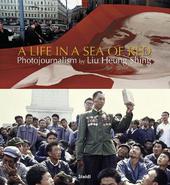
|
Liu Heung Shing: A Life in a Sea of Red
Hardback
Main Details
| Title |
Liu Heung Shing: A Life in a Sea of Red
|
| Authors and Contributors |
By (author) Liu Heng Shing
|
| Physical Properties |
| Format:Hardback | | Pages:286 | | Dimensions(mm): Height 328,Width 305 |
|
| Category/Genre | Individual photographers |
|---|
| ISBN/Barcode |
9783958295452
|
| Classifications | Dewey:779.092 |
|---|
| Audience | |
|---|
| Illustrations |
Illustrated in colour and black and white throughout
|
|
Publishing Details |
| Publisher |
Steidl Publishers
|
| Imprint |
Steidl Verlag
|
| Publication Date |
20 June 2019 |
| Publication Country |
Germany
|
Description
This book contains the two most important bodies of work by Pulitzer-Prize-winning photojournalist Liu Heung Shing: photos of the pivotal decades of Communism in China and Russia, made between 1976 and 2017. Adapting the phrase "alive in the bitter sea" from a Chinese proverb about perseverance in tumultuous times, A Life in a Sea of Red presents scenes of hope, hardship and change under and after Communist rule. Understanding the death of Mao Zedong in 1976 as the harbinger of change for China, Liu arrived in Beijing in 1978 to photograph the country at a moment of momentous transition for Time magazine. This he did in an empathetic, unfiltered manner beyond the visual narrative perpetuated by the Chinese government-from the withdrawal of Mao's portraits from the public realm, to the increase in free commercial, artistic and personal expression, to the 1989 violence on Tiananmen Square and, more recently, the rise of yuppies who show how China has recast Communism in a socialist-capitalist mold. In contrast, Liu's photos of Russia, taken between 1990 and 1993, document the collapse of a Communist state. The most enduring of these shows Mikhail Gorbachev throwing down the speech he delivered on 25 December 1991, announcing his resignation and signaling the end of the Soviet Union and Cold War. This photo, which embodies Liu's ability to convey complex narratives in a single frame, is from the series that was awarded a Pulitzer Prize in 1992. The subjects and objects of Liu's works, preserved with eternal dignity, will probably never reveal the truth of history and reality, yet have been imprinted on people's memories along with our long-lasting curiosity, leading the way to the past and the present. Pi Li, Sigg Curator for Chinese Art, M+ museum, Hong Kong.
Author Biography
Hong-Kong-born Liu Heung Shing's honors include Best Photographer from the Associated Press (1989 and 1991), Picture of the Year by the School of Journalism at the University of Missouri (1989) and the Overseas Press Club Award (1992). Liu has documented major international events throughout his four-decade career, and his acclaimed books include China after Mao: "Seek Truth from Facts" (1983), China, Portrait of a Country (2008) and China in Revolution: The Road to 1911 (2012).
Reviews[A Life in a Sea of Red] features gripping images taken four decades of chaotic revolution and tumultuous change as the West's Cold War adversaries struggled to cope with change under and after the Communist rule.-- "ColdType" [A Life in a Sea of Red] is an adaptation of the Chinese phrase "alive in the bitter sea. The original phrase means to survive life's hard circumstances and for Liu Heung Shing it aptly describes the life of people under the Communist rule in the People's Republic of China and the Soviet Union.--Caterina Bellinetti "Art and Object" [Liu Heung Shing's] candid portraits and ground-level street photography offer a distinctly human perspective.--Oscar Holland "CNN" Liu, a Pulitzer Prize winner, used his lens to catch the poetry, drama and even humour of daily life under these regimes - and what happened when unrest inevitably boiled over.--Joyce Lau "South China Morning Post" Liu's impressive new photo book, "A Life in a Sea of Red," is a rat-a-tat-tat I-was-there collection of the most memorable, most revealing pictures made during a 40-year career covering China and Russia at times of unprecedented upheaval.--Bill Shapiro "Los Angeles Times" Scenes of hope, hardship and change under Communist party rule.-- "Guardian"
|